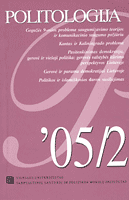Lietuvos Respublikos Prezidento vaidmuo įstatymų leidyboje
The Role of the President of Lithuania in the Legislative Process
Author(s): Petras RagauskasSubject(s): Politics / Political Sciences
Published by: Vilniaus universiteto leidykla & VU Tarptautinių santykių ir politikos mokslų institutas
Keywords: fields of the activity (competence) of the President of Lithuania; legislative process in Lithuania
Summary/Abstract: It is necessary to have in mind the main three fields of the activity (competence) of the President of Lithuania in order to sum up his role in the legislative process: 1) proposing draft bills to the Seimas; 2) proposing draft bills for the ratification of international treaties to the Seimas; 3) signing or vetoing the bills passed by the Seimas. Statistical data shows that the President is not very active in the field of proposing draft bills to the Seimas: during the nine years since the adoption of Lithuanian Constitution at the 1992 he had introduced 106 draft bills (i. e. just a little bit more than 1 proc. of the total amount of the draft bills introduced during the period). It is important to mention that there is no ground to maintain that these bills were of greater political, economical, social or some other kind of importance or that they were very complex or fundamental ones. Therefore technically (not in the sense of division of powers) the role of the President in introducing the bills is not substantial for the process of legislation. Some factors enables making the finding that such role has been chosen deliberately. The minor role in introducing the bills is being degraded even more because of the prevailing practice of the standing committees of the Seimas to introduce new bills replacing the ones introduced by the President. It seems to be symptomatic that it is almost the half of the draft bills introduced by the President which are connected to criminal law, criminal procedure, courts, police and other institutions which are in charge of control of criminal activity. Unfortunately it is not easy to perceive if this fact has mostly been determined by the professional competence of the Presidential Administration or by the powers of the President of Lithuania. Despite the fact that the President is not empowered to ratify international treaties by himself, he has important powers in the process of ratification. Firstly, only the President is empowered to propose the ratification of an international treaty to the Seimas. Secondly, if the Seimas has ratified the treaty irrespectively of the clauses proposed by the President or if it has made some new unacceptable clauses, the President may veto the bill of ratification (it is important to mention that this situation is merely hypothetical and have never occurred during the nine year period).
Journal: Politologija
- Issue Year: 2002
- Issue No: 4 (28)
- Page Range: 35-74
- Page Count: 40
- Language: Lithuanian

